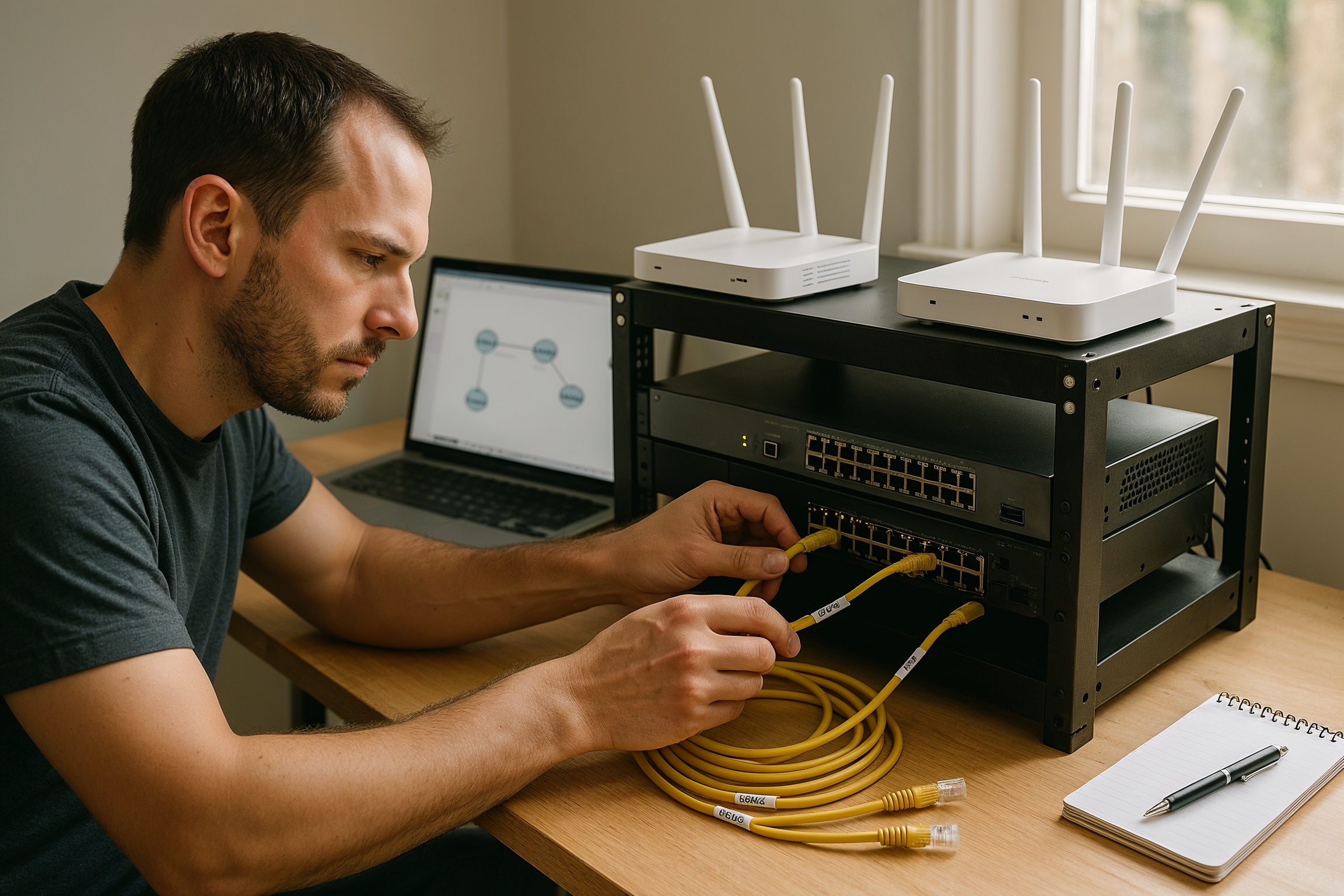Career Roadmap for Network Engineering Beginners: Step-by-Step Guide to IT Career Transitions & “No Experience” Entry
Career Roadmap: IT Career Transitions & “No Experience” Entry


Are you considering a transition into IT, but worried about your lack of experience or a traditional degree? If you are interested in networking, cybersecurity, or cloud and DevOps roles, the journey into these high-demand fields can be faster and more accessible than you might think. This guide is built for adults making IT career transitions & “no experience” entry, including career changers, veterans, and tech enthusiasts who want a direct route to job-ready skills and roles.
What Is the Fastest Way to Start a Networking Career with No IT Experience?
Launching a networking career without prior IT experience is absolutely possible. The quickest and most effective path is to build foundational knowledge, earn relevant industry certifications, gain practical hands-on experience through labs or entry-level roles, and leverage modern, immersive training programs that focus on real-world skills instead of theory or degrees. With the right steps, you can qualify for networking jobs in less than a year.
Understanding the Network Engineering Landscape
Network engineers are essential professionals who design, implement, and maintain the digital infrastructure powering every business. The global networking market is projected to reach $577.56 billion by 2028, fueled by investments in 5G, cloud networking, and IoT. This rapid growth creates a strong demand for network engineers—especially those who understand both core fundamentals and emerging technologies like automation, cloud, and security.
Unlike many traditional IT roles, network engineering has flexible entry paths. Employers increasingly value practical skills, certifications, and hands-on experience over formal degrees, making the field especially attractive for those making career transitions or coming from non-technical backgrounds.
Step 1: Build a Strong Educational Foundation
Master Networking Fundamentals
Start by learning the core concepts that underpin all networked systems:
- TCP/IP, DNS, DHCP, HTTP/HTTPS
- Routing protocols (BGP, OSPF)
- IP addressing and subnetting
- Switching and VLANs
Free and paid online resources, such as the Intro to Network Engineering mini-course, provide structured, beginner-friendly material and hands-on labs to help you grasp these essentials.
Understand Network Security Basics
Security is integral to every networking job. Learn about firewalls, VPNs, encryption methods, and basic defense strategies. This will prepare you for both networking and cybersecurity roles down the line.
Get Familiar with Networking Hardware
Even in today’s software-driven world, knowledge of routers, switches, and access points remains critical. Virtual labs and simulators (like GNS3 or Cisco Packet Tracer) let you experiment safely and affordably from home.
Certification: Your Ticket to Entry
Certifications help you prove your skills and stand out. The most recognized entry-level certification is the Cisco Certified Network Associate (CCNA). It covers all foundational topics and is respected by employers worldwide. You can also consider CompTIA Network+ and Security+ if you want a broader IT perspective. For a deeper look at how entry-level IT certifications accelerate IT career transitions & “No Experience” Entry—including benefits, ROI, and job pathways for career changers—see this guide.
Step 2: Choose Your Specialty Track
As you build your foundation, consider which specialty aligns with your interests and market demand.
- Network Automation & Programming: Leverage Python, APIs, and tools like Ansible or Terraform to automate network tasks and deployments.
- Cloud Networking: Design and manage virtual networks in AWS, Azure, or Google Cloud. Skills in VPCs, hybrid connectivity, and cloud security are highly sought after.
- Network Security: Focus on defending networks from threats. Advanced certifications (e.g., CCNP Security, Certified Ethical Hacker) open doors to cybersecurity roles.
- AI & Machine Learning for Network Engineers: Analyze network data and automate responses using AI tools. This hybrid field is growing fast and requires cross-disciplinary training.
NGT Academy’s Network Engineer Program + Cybersecurity Accelerator is designed for these emerging needs, combining live instruction, mentorship, and real-world projects to help you choose and excel in your chosen path.

Step 3: Learn Current and Emerging Technologies
Why Staying Current Matters
Technology evolves rapidly in IT. To stay competitive, you need to keep learning about:
- Software-Defined Networking (SDN) and SD-WAN (e.g., Cisco SD-WAN, Versa SD-WAN)
- Cloud-native networking (AWS VPC, Azure VNets, GCP networking)
- Network observability and monitoring (Prometheus, Grafana, NetFlow)
- Infrastructure-as-Code (Terraform, Ansible)
- Modern firewalls and zero trust security models
Certifications and hands-on labs are the best way to validate these skills and show employers you are ready for today’s hybrid cloud environments.
How Do You Get Practical Experience in Networking?
Practical experience is essential for IT career transitions & “no experience” entry. You can start by setting up a home lab using free tools like Packet Tracer or GNS3, where you can simulate real-world network configurations and troubleshooting. Internships, entry-level support roles, or volunteering for local organizations also help you gain valuable experience. Joining open-source networking projects and publishing your work on GitHub can further showcase your abilities to employers.

Step 4: Build Your Portfolio and Professional Network
Showcase Your Skills
Document your lab projects, network designs, and troubleshooting exercises. Create a GitHub repository or a simple website to share your work. Employers increasingly value practical demonstrations of skill over academic credentials.
Expand Your Professional Network
Join online forums, local meetups, and professional associations. Attend industry bootcamps or conferences to connect with mentors, hiring managers, and peers. NGT Academy’s career coaching and employer network can help you access hidden job opportunities.
Step 5: Advance with Certifications and Continuous Learning
- After CCNA, consider pursuing the CCNP (for advanced enterprise networking), DevNet Associate/Professional (for automation), or cloud-specific certifications (AWS/Azure/GCP networking tracks).
- For security, look at CCNP Security or Certified Ethical Hacker as your next steps.
- Stay engaged with new trends such as AI-driven networking, SD-WAN, and cloud security to future-proof your career.
For those seeking a Cloud and DevOps focus, the Cloud/DevOps Engineering program at NGT Academy provides an immersive, fast-track route from networking fundamentals to job-ready expertise in cloud infrastructure, automation, and modern DevOps practices.
Common Myths About IT Career Transitions & “No Experience” Entry
- Myth 1: You need a computer science degree to get hired. Reality: Many employers value certifications, practical skills, and hands-on experience even more.
- Myth 2: The cloud will replace network engineers. Reality: The role is evolving, not disappearing—skills in cloud networking, automation, and security are more valuable than ever.
- Myth 3: You need to know advanced coding. Reality: Scripting (Python, APIs) is important, but you do not need to be a software developer to excel as a network engineer.
Success Tips for Career Changers
- Focus on hands-on labs and projects. Employers want real-world skills, not just book knowledge.
- Complete certifications and portfolio projects fully—commitment stands out.
- Choose immersive, job-focused training with mentorship and career support, like NGT Academy’s programs.
- Embrace continuous learning and adaptability. The IT landscape is always changing.
Adopting a growth mindset is especially helpful for thriving in modern, remote-friendly IT roles; learn practical strategies for balancing work-life and accelerating personal growth in this article.
Ready to Start Your Network Engineering Journey?
If you are serious about making an IT career transition & “no experience” entry, NGT Academy’s structured training programs, hands-on labs, and direct employer connections can help you launch your networking or cloud/DevOps career—no degree required. Explore the Intro to Network Engineering mini-course to experience our immersive, military-grade training style and discover your path into IT.
FAQ
What qualifications do I need to become a network engineer if I have no prior IT experience?
While a degree can help, it is not required. Focus on foundational knowledge, certifications (like CCNA or Network+), and hands-on labs. Practical experience and a portfolio are the keys to landing your first role.
Can I transition into a networking career from a completely different field?
Yes. Many network engineers start in unrelated fields. Career changers can leverage immersive, skills-based training programs and certifications to bridge the gap and demonstrate job readiness.
How long does it take to become job-ready in networking?
With focused learning and hands-on practice, you can become job-ready within 6–12 months. Fast-track programs and bootcamps, like those at NGT Academy, are designed to accelerate your journey.
Do I need to know programming to succeed as a network engineer?
Basic scripting (Python, APIs) is increasingly important, especially for automation and cloud roles. However, deep coding expertise is not mandatory for most entry-level positions.
What are the most valuable certifications for starting a networking career?
Start with CCNA or CompTIA Network+. As you progress, consider CCNP, DevNet Associate, and cloud certifications from AWS, Azure, or GCP for greater advancement.
